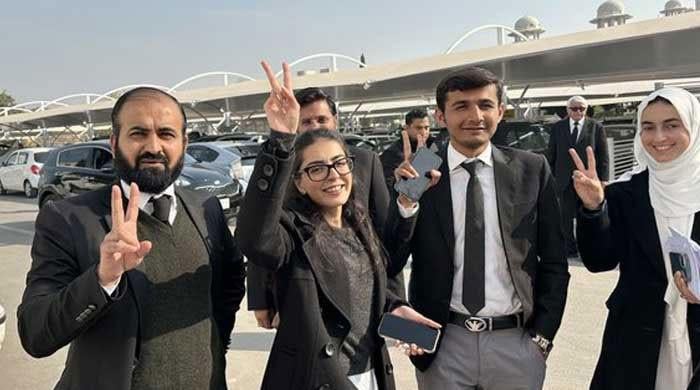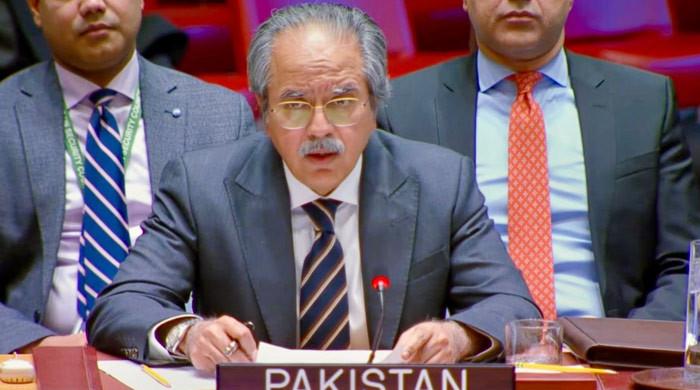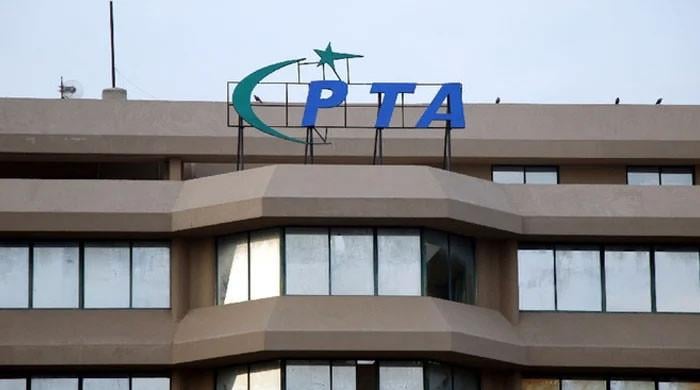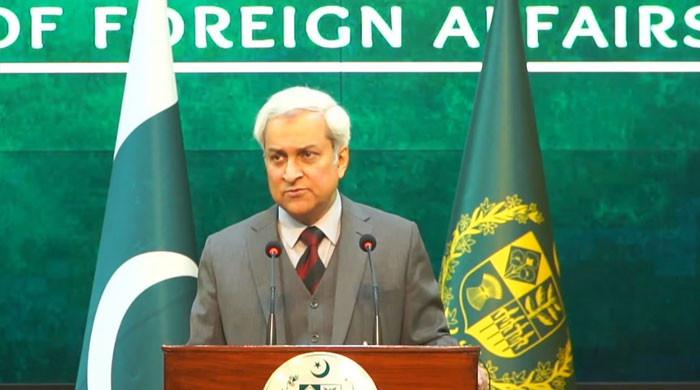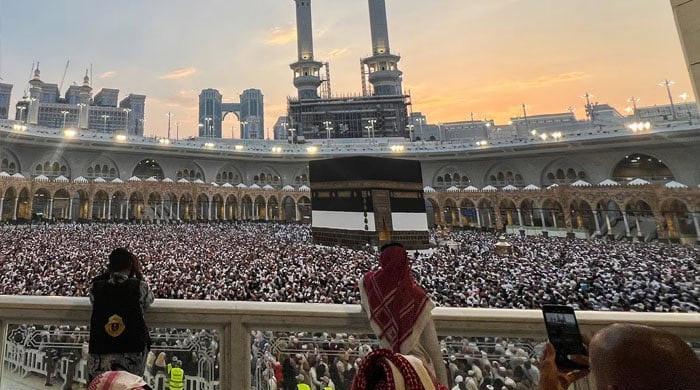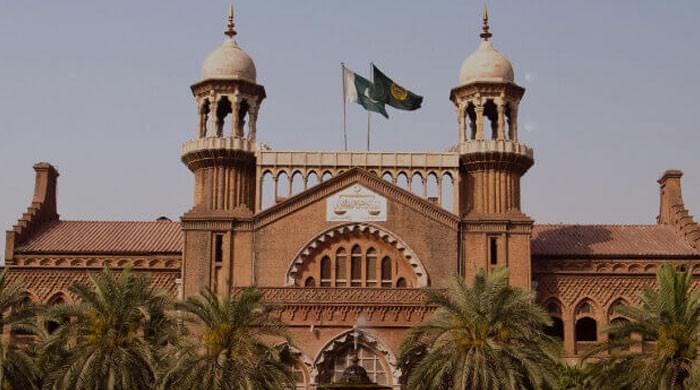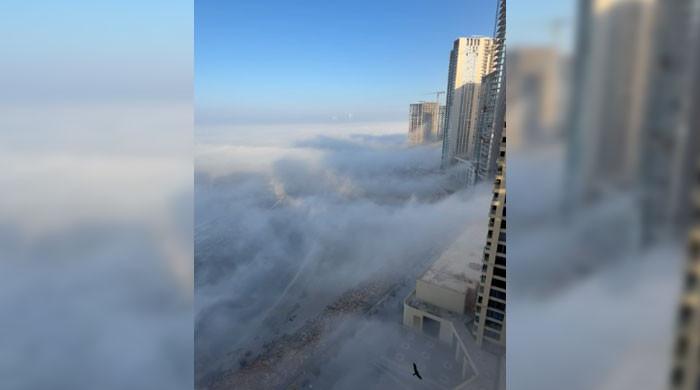Nawaz Sharif's sentence suspended for eight weeks in Al-Azizia case
Two-member bench comprising Justice Amir Farooq and Justice Mohsin Akhtar Kayani heard the case
October 29, 2019
ISLAMABAD: The Islamabad High Court on Tuesday granted bail to former Prime Minister Nawaz Sharif in the Al-Azizia corruption reference, suspending his sentence for eight weeks on medical grounds.
A two-member judge bench comprising Justice Amir Farooq and Mohsin Akhtar Kayani reserved the verdict earlier today on the plea filed by Shehbaz Sharif seeking the suspension of his brother’s sentence in the case.
In its verdict, the high court ordered that if Sharif's condition does not improve in eight weeks, then the Punjab provincial government should be approached for a bail extension. The former prime minister was asked to submit two bail bonds worth Rs2 million.
According to a detailed written sentence released by the IHC: “In case the indisposition of petitioner No.2 continues, he before the expiry of period of eight (8) weeks may approach the Government of Punjab under Section 401 (2) Code of Criminal Procedure,1898 and until the decision of the Provincial Government on the application he shall continue to remain on bail.”
The court also cautioned in case of failure to approach the provincial government in the said period, the bail granted will stand revoked.
The court in the same case had granted the former premier interim bail on Saturday. Nawaz Sharif has already been granted bail in the Chaudhry Sugar Mills case from the Lahore High Court.
According to Nawaz's personal physician, Dr Adnan, the former prime minister is in a critical condition, suffering from 'Thrombocytopenia (low platelet count) & NSTEMI (heart attack),' made further complicated by his kidney issues.
CM Punjab presents report before court
During the hearing today, Punjab Chief Minister Usman Buzdar appeared before the court and presented a report regarding the health of the former prime minister.
Buzdar told the IHC that the former premier trusts the medical care being provided to him. He added that the PML-N supremo was under treatment at the hospital and they will take care of him.
Read also: Nawaz granted interim bail in Al-Azizia reference on medical grounds
The chief minister further said that over the last year he had visited the jails eight times and provided relief to close to 4,000 prisoners, and paid fines for at least 600 prisoners. He added that his government will reform the prisons system.
Dr Adnan briefs the court
Meanwhile, the former premier’s personal physician Dr Adnan Khan told the court that a normal person’s blood platelets are more than 100,000 but Nawaz’s platelets were very low, which is why a medical board of highly qualified doctors was formed to review his health.
Dr Adnan told the court that the PML-N leader spoke of his cardiac issues while being treated for low platelets, adding that if they try to cure one disease another one crops up.
He added that the former prime minister was fighting for his life because when the doctors gave him prescriptions for low platelets he got a heart attack.
Read also: Nawaz Sharif shifted to hospital with low platelet count
Dr Adnan also informed the judges that Nawaz had multiple health problems. To this, MS Services Hospital told the court that the former premier’s condition was still in danger.
Nawaz can continue sentence after treatment
After hearing the doctor’s opinion, Nawaz’s lawyer Khawaja Harris told the court that due to the former premier’s angina, doctors cannot treat all his ailments. He added that according to the October 26 report, Nawaz's heart was not pumping blood completely and that was necessary that all medical treatment should be given under a single roof.
Harris said that his client did not have any objections against the doctor’s intentions but the medical board itself was not satisfied with the results.
Read also: Nawaz Sharif fighting battle for life: doctor
The lawyer said if they want to ensure that Nawaz completes his sentence then he should be allowed to get treatment from doctors of his choice. He added that if the former prime minister’s health improves then he can continue serving his sentence.
Court should suspend sentence under a time frame: NAB
Meanwhile, Additional Prosecutor General for NAB, Jahanzaib Bharwana, said that the Supreme Court suspended Nawaz’s sentence for six weeks on health grounds and had set certain conditions. He added under the conditions it was decided that the former premier will not leave the country within those six weeks and seek treatment from doctors of his choice in Pakistan.
Bharwana further said that no doctor has said that the former premier’s treatment cannot be done in Pakistan, adding that even the federal government has claimed that they are willing to get doctors from abroad for the PML-N leader.
To this, Justice Aamir Farooq remarked, “does the suspension of the sentence of the convicted fall under federal or Punjab’s [government's] domain?”
The additional prosecutor told the court that the issue is under both, the federal and Punjab governments.
Bharwana suggested to the court that it should suspend the sentence under a time-frame like the Supreme Court and also review the former prime minister’s health report.
Nawaz’s lawyer Khawaja Harris interjected saying, “we are not seeking the suspension of the sentence for five of six years.”
To this, Justice Mohsin remarked that they would have given a verdict on the appeal had the arguments been presented, but so far the hearing on the judge’s video scandal has not even ended.
Justice Farooq asked, “Is it possible that the president can issue a pardon before the decision on the appeal?” To this, Harris replied that the president can exercise his powers at any moment but the precedent is that the appeal’s decision should go through all the forums.
Justice Mohsin remarked that apart from NAB neither the Punjab or federal government’s position is clear on the issue. He added that federal and provincial governments have failed to determine their opinion on the matter, adding that both the governments are confused.
Justice Farooq remarked the court had four options. “Either the issue can be sent to an executive or we could suspend the sentence in the given time-frame by the accountability bureau.”
Nawaz’s lawyer however rejected the notion of sending the issue to the executive.
After hearing arguments from both the sides, the court reserved its verdict.




